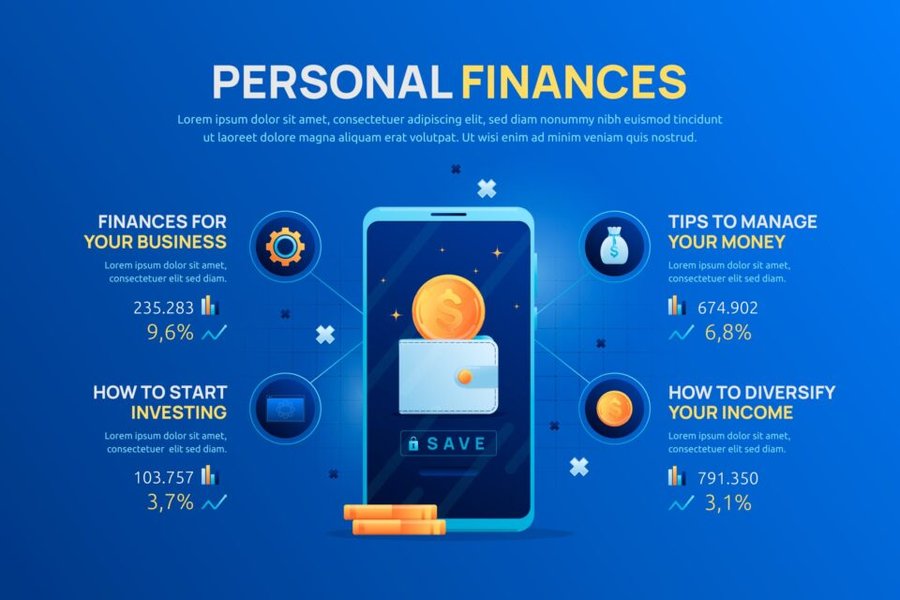Introduction
Managing your personal finances can be a daunting task, especially when you’re juggling multiple expenses, debts, and financial goals. However, in today’s digital age, there’s a solution at your fingertips – personal finance apps. These innovative tools have transformed the way people budget, save, and invest. In this blog, we’ll explore how personal finance apps can make budgeting easy and help you take control of your financial future.
The Power of Personal Finance Apps
Personal finance apps are software applications designed to help individuals manage their money, budget effectively, track expenses, and make informed financial decisions. They come in various forms, from basic budgeting apps to comprehensive financial management platforms. These apps offer a wide range of features that can significantly improve your financial well-being. Here are some of the key advantages of using personal finance apps:
1. Simplified Budgeting
One of the primary benefits of personal finance apps is their ability to simplify the budgeting process. These apps allow you to create a budget quickly and easily by categorizing your income and expenses. You can set spending limits for various categories and track your progress in real-time. This simplification makes it more likely that you’ll stick to your budget, ultimately helping you save money.
Read more: Robo-Advisors in the Wealth Management Industry: Transforming the Landscape
2. Expense Tracking
Tracking expenses manually can be time-consuming and error-prone. Personal finance apps streamline this process by automatically categorizing and recording your expenses. They connect to your bank accounts and credit cards, and with minimal effort on your part, they provide you with an accurate overview of where your money is going. This information is crucial for identifying areas where you can cut back and save.
3. Goal Setting and Monitoring
Whether you’re saving for a vacation, a new car, or retirement, personal finance apps allow you to set financial goals. You can input your desired savings targets, and the app will help you monitor your progress. This visual representation of your goals can be incredibly motivating and keep you on track.
4. Investment Management
For those looking to grow their wealth, many personal finance apps offer investment management features. They provide insights, recommendations, and even automated investing options. These tools help you make informed decisions about your investments, whether you’re a seasoned investor or a beginner.
5. Debt Management
Managing and paying off debt is a significant financial challenge for many individuals. Personal finance apps can assist you in creating a plan to reduce and eventually eliminate your debts. They offer strategies for debt repayment and can show you the potential time and interest savings of different approaches.
6. Credit Score Monitoring
Your credit score plays a crucial role in your financial life, impacting your ability to secure loans, credit cards, and favorable interest rates. Personal finance apps often include features for monitoring your credit score. You can stay informed about any changes and take steps to improve your creditworthiness.
7. Expense Reports
Whether you need to track business expenses or simply want a comprehensive overview of your financial history, personal finance apps can generate detailed expense reports. These reports make tax season and financial planning much more manageable.
Choosing the Right Personal Finance App
Selecting the right personal finance app for your needs is crucial. With numerous options available, it’s essential to consider the following factors:
1. Budget and Goals: Determine your financial goals and budgeting needs. Some apps specialize in budgeting, while others offer comprehensive financial management features. Choose one that aligns with your priorities.
2. User-Friendly Interface: Look for an app with an intuitive, user-friendly interface. You’ll be using it regularly, so it should be easy to navigate and understand.
3. Security and Privacy: Ensure the app has robust security measures in place, such as encryption and two-factor authentication, to protect your financial data.
4. Compatibility: Check whether the app is available on your preferred platform (iOS, Android, web) and if it supports the financial institutions you use.
Read more: Benefits and Drawbacks of Robo-Advisors: A Comprehensive Analysis
5. Cost: While many personal finance apps offer free versions, some charge for premium features. Consider your budget and what features you truly need.
6. Reviews and Ratings: Research the app by reading user reviews and checking its ratings on app stores. Positive reviews can indicate a reliable and effective app.
7. Customer Support: Evaluate the app’s customer support options. It’s beneficial to have access to assistance if you encounter issues or have questions.
The Future of Personal Finance Apps
As technology continues to evolve, personal finance apps are likely to become even more powerful and convenient. Here are some trends and developments to look out for in the future:
1. Integration with Cryptocurrency: As cryptocurrencies gain popularity, more personal finance apps may integrate features to help users manage their crypto investments alongside traditional assets.
2. Artificial Intelligence (AI) and Machine Learning: These technologies will enable apps to provide more personalized financial advice and recommendations based on individual spending and saving patterns.
3. Sustainability and Ethical Investing: Personal finance apps may include tools for users interested in aligning their investments with their values, such as investing in environmentally sustainable companies or supporting ethical businesses.
4. Enhanced Security: As cybersecurity threats evolve, personal finance apps will continually update their security measures to protect user data and financial assets.
5. Deeper Integration with Financial Institutions: Apps may form deeper partnerships with banks and financial institutions, making it even easier for users to manage their accounts and conduct transactions directly within the app.
FAQs: Your Guide to Using Personal Finance Apps
Q1: Are personal finance apps safe to use?
Yes, reputable personal finance apps are safe to use. They use encryption and secure protocols to protect your financial data. However, it’s crucial to choose well-established, trustworthy apps from reputable sources, such as app stores.
Q2: Do I need to pay for a personal finance app to get the best features?
Not necessarily. Many personal finance apps offer free versions with essential features. Premium versions may provide additional features, but you can manage your finances effectively with free apps.
Q3: Can I connect all my financial accounts to a personal finance app?
Most personal finance apps allow you to connect bank accounts, credit cards, and investment accounts. However, the availability of specific connections can vary by app and region.
Q4: Are personal finance apps suitable for managing joint finances with a partner or spouse?
Yes, many personal finance apps offer options for sharing and managing joint finances. You can create shared budgets and accounts to collaborate with your partner.
Read More: The Evolution of Mobile Wallets: A Comparison of Venmo, PayPal, and Other Payment Apps
Q5: Can personal finance apps help me save for retirement?
Absolutely. Personal finance apps can help you set retirement savings goals and track your progress. Some even offer retirement planning tools to estimate how much you need to save for a comfortable retirement.
Q6: Do personal finance apps provide investment advice?
While personal finance apps can offer investment insights and recommendations, they typically don’t replace the need for professional financial advice, especially if you have complex investment needs.
Q7: Can personal finance apps help me pay off my student loans or credit card debt?
Yes, many personal finance apps offer debt repayment features, providing strategies to pay down loans and credit card balances faster. They can help you create a repayment plan and track your progress.
Q8: Will using a personal finance app affect my credit score?
Using a personal finance app itself does not impact your credit score. However, monitoring your credit score through the app can help you make informed decisions that may positively affect your creditworthiness.
Q9: Are personal finance apps available for all devices and platforms?
Most personal finance apps are available for both iOS and Android devices, and many also have web versions for use on desktop computers. However, availability can vary by app, so it’s essential to check the specific app’s compatibility.
Q10: Can I trust the financial advice and recommendations provided by personal finance apps?
Personal finance apps typically provide general advice and recommendations based on algorithms and historical data. While they can be helpful, it’s always a good idea to cross-reference their suggestions with advice from financial experts or professionals.
In conclusion, personal finance apps have made budgeting and financial management more accessible and efficient than ever. With the right app, you can take control of your finances, achieve your goals, and secure your financial future. However, it’s essential to choose a reliable app, consider your specific needs, and stay informed about the ever-evolving landscape of personal finance tools. So, go ahead, explore the world of personal finance apps, and transform your finances for the better.
Image Source: Freepik




